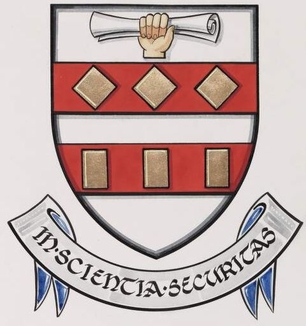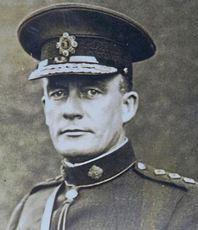Related Research Articles

The Garda Síochána is the national police and security service of Ireland. It is more commonly referred to as the Gardaí or "the Guards". The service is headed by the Garda Commissioner, who is appointed by the Irish Government. Its headquarters are in Dublin's Phoenix Park.

Garda Síochána College is the education and training college of the Garda Síochána. It is located at McCan Barracks, Templemore, County Tipperary in Ireland. The college has been in Templemore since 1964.

Eamon "Ned" Broy was successively a member of the Dublin Metropolitan Police, the Irish Republican Army, the National Army, and the Garda Síochána of the Irish Free State. He served as Commissioner of the Gardaí from February 1933 to June 1938. He later served as president of the Olympic Council of Ireland for fifteen years.
The Special Detective Unit (SDU) is the main domestic security agency of the Garda Síochána, the national police force of Ireland, under the aegis of the Crime & Security Branch (CSB). It is the primary counter-terrorism and counter-espionage investigative unit within the state. The Special Detective Unit superseded the Special Branch, which itself replaced the older Criminal Investigation Department (CID), which was founded in 1921. They work in conjunction with the Defence Forces Directorate of Military Intelligence (J2) – Ireland's national intelligence service – on internal matters. The unit's headquarters are in Harcourt Street, Dublin City.

Garda GAA is a Gaelic Athletic Association club based in Dublin, Republic of Ireland, founded in 1922. They are the GAA representative team of the Garda Síochána. Garda have won the Dublin Senior Football Championship on six occasions in 1927, 1929, 1933, 1934, 1935 and 1948. Garda won the Dublin Intermediate Football Championship on one occasion in 1986, bringing them back to senior status. Garda have also had success as a hurling side, having also won the Dublin Senior Hurling Championship on six occasions in 1931, 1929, 1928, 1927, 1926 and 1925. Westmanstown Gaels is the juvenile division of the club and was set up in 2005.

The Garda Public Order Unit – commonly known as the Garda Riot Squad – is a unit of the Garda Síochána, Ireland's police force, that deals with public disorder, including riots and protests.

The GardaNational Bureau of Criminal Investigation (GNBCI) - formerly known as the Central Detective Unit (CDU) - is the main national criminal investigative branch of the Garda Síochána, the national police force of Ireland.
The Garda Síochána Ombudsman Commission (GSOC) is an independent statutory body in Ireland charged with overseeing the Garda Síochána, the national police force. It is a three-member body established under the Garda Síochána Act 2005 to deal with complaints from members of the public about the conduct of Gardaí.

Law enforcement in the Republic of Ireland is the responsibility of Ireland's civilian police force, the Garda Síochána, commonly referred to as the Gardaí. It is responsible for all civil policing within the country and has been the only territorial police force since their merger with the Dublin Metropolitan Police in 1925.
Armed Support Units (ASU) are specialist regional firearms units of the Garda Síochána, the national police force of Ireland. Based in all four Garda regions in the country, Gardaí attached to an ASU unit carry a combination of lethal firearms and non-lethal weapons, as opposed to regular uniformed Gardaí, who are unarmed, and detective gardaí, who are armed but not assigned to ASU roles.
The Airport Police Service (APS) is a small private police force responsible for providing general security and aviation security duties at the three state airports in Ireland: Dublin Airport, Cork Airport and Shannon Airport. The Airport Police Service was first founded in 1936 in Dublin Airport and first became "Authorised Officers" under section 15 of the Air Navigation and Transport Act 1950 for the Minister of Transport.
William P. Quinn was born in Inniskeen, County Monaghan, Ireland. He was the son of Thomas J. Quinn, the principal of the National School. He joined the Garda Síochána in December 1922 and was the first recruit to rise through the ranks to the office of Commissioner.
The Garda National Immigration Bureau is a unit of the Garda Síochána, the police force of the Republic of Ireland. It was formed in May 2000, and is responsible for the enforcement of immigration law in Ireland.
The Garda National Drugs and Organised Crime Bureau (DOCB) is a specialist national unit within the Garda Síochána, Ireland's national police service, responsible for proactively targeting and investigating drug trafficking and serious organised crime both within Ireland and outside the jurisdiction. The Drugs and Organised Crime Bureau has a complement of 111 Detective Gardaí and a total staff of up to 400 officers, all of whom are armed.

The Garda Commissioner – officially known as the Commissioner of An Garda Síochána – is the head of the Garda Síochána, the national police force of Ireland. The Garda Commissioner is appointed by the Government of Ireland (Cabinet), on the recommendation of the Minister for Justice. The Commissioner reports to the Minister for Justice, in charge of the Department of Justice, of which the Garda Síochána is a state agency. The Garda Commissioner sits on the Irish Government's National Security Committee (NSC), and is responsible for Ireland's domestic state security apparatus.
The GSOC bugging scandal in February 2014 involved revelations that the offices of the Garda Síochána Ombudsman Commission, Ireland's independent police watchdog, were under covert electronic surveillance by an unknown party. John Mooney, security correspondent for The Sunday Times, first published the story alleging that GSOC had been the subject of surveillance by an unidentified party using "government level technology" to hack into its emails, Wi-Fi and telephone systems. The espionage operation was uncovered by a private British counter-surveillance firm, Verrimus, whom GSOC hired after its suspicions became aroused of outside spying on the organisation and its activities.

Jeremy Andrew Harris, is the current Commissioner of the Garda Síochána in the Republic of Ireland, having assumed office in September 2018. He previously served as Deputy Chief Constable of the Police Service of Northern Ireland (PSNI) from 2014 to 2018.
A police union is a trade union for police officers. Police unions formed later than most other occupations, reflecting both a conservative tendency and relatively superior working conditions. The first police unions formed in the United States. Shortly after World War I, the rising cost of living, wage reductions, concerns over amount of rest and growing dissatisfaction among rank and file police officers led to a number of police strikes from 1918-1923 and the formation of police unions globally.

A series of riots began in Dublin, Ireland on the night of 4 June 2021 over the June bank holiday weekend and during the COVID-19 pandemic, in which glass bottles and other objects were thrown at members of the Garda Síochána. A number of public order incidents began when Gardaí attempted to disperse large organised groups congregating at a number of locations including South William Street, St Stephen's Green and Temple Bar Square.
The Association of Garda Sergeants and Inspectors (AGSI) is the statutory staff association for police officers of the ranks of Sergeant, Station Sergeant and Inspector in Ireland. Irish law prohibits members of the Garda Siochana from joining trade unions because of a view from Government that police industrial action would pose a risk to public safety. The AGSI is a 1978 reconstitution of a Representative Body for Inspectors, Station Sergeants and Sergeants (RBISS) set up under 1962 regulations. Three similar organisations exist for Gardai of other ranks up to that of Chief Superintendent. As of September 2023, the association had a membership of around 2,500. It is funded by a levy on its members. All Garda members of the appropriate ranks may apply to join.
References
- 1 2 Garda Síochána (Associations) Regulations, 1978 ( S.I. No. 135 of 1978 ). Signed on 9 May 1978. Statutory Instrument of the Government of Ireland .Retrieved from Irish Statute Book .
- ↑ Moore, Kevin (10 December 1989). "Crunch talks for garda counselling". The Sunday Independent. p. 2.
- 1 2 McDonagh, Sean (2023). Candidate Briefing Document for the position of Deputy General Secretary, Garda Representative Association. Dublin: Lansdowne Executive Search. pp. 1, 2.
- 1 2 3 4 5 6 Doyle, Tim (2021). Changing of the Guard. Dublin: Currach Books. ISBN 978-1-78218-929-9.
- ↑ Moore, Stephen, ed. (2022). The Guardians: 100 Years of An Garda Siochana. Dublin: O'Brien Press. ISBN 978-1-78849-339-0.
- ↑ Garda Síochána (Representative Bodies) Regulations, 1962 ( S.I. No. 62 of 1962 ). Signed on 13 April 1962. Statutory Instrument of the Government of Ireland .Retrieved from Irish Statute Book .
- ↑ Rae, Stephen; MKenna, Gene (1 May 1998). "Army stands by to ease Garda pay protest chaos". The Irish Independent . p. 1.
- ↑ O'Connor, Niall (26 July 2023). "Rank and file gardaí to vote on no confidence motion in Garda Commissioner". The Journal. Retrieved 11 August 2023.
- ↑ Staines, Michael (9 August 2023). ""Whatever the vote is, I'm not leaving" - Garda Commissioner on no confidence vote". Newstalk. Retrieved 11 August 2023.
- ↑ Reynolds, Paul (13 September 2023). "GRA vote of no confidence in Harris passes unanimously". RTE News. Retrieved 13 September 2023.
